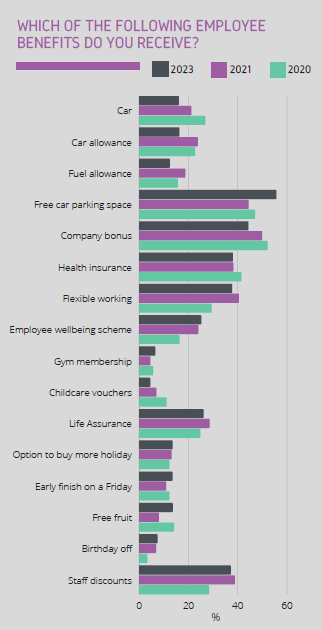
The Importance of Well-being Schemes in the Workplace
Our 2023 Salary & Benefits survey concluded that 25% of respondents have well-being schemes as a workplace benefit. Compared to the 2019 statistic of 16% it's evident that these types of schemes are gaining traction. This suggests that employers are becoming more conscious of employees' mental health, most likely as a result of the pandemic.
What is a well-being scheme? A well-being scheme can be anything that involves investing time and resources in supporting employee's physical and mental health. Most businesses will choose an array of schemes to benefit different employee preferences. For example, employees with children may prefer to finish early on a Friday to allow them more family time rather than a free parking space at work. Which in turn, may be a preference for those employees on a lower salary to allow them a higher disposable income.

Below are some reasons why businesses should implement well-being schemes if they're not doing so already;
Enhanced Productivity: Employee well-being programs contribute to higher levels of productivity. When employees are physically and mentally well, they are more engaged, focused, and motivated at work. This translates into improved performance and better results for the organisation.
Attracting and Retaining Talent: In a competitive job market, offering well-being programs can make your company more attractive to top talent. It not only helps in recruiting but also in retaining skilled employees, reducing turnover and associated costs.
Healthcare Cost Reduction: Employee well-being programs can lead to a healthier workforce. Encouraging employees to adopt healthier lifestyles, including exercise and balanced diets, can reduce healthcare costs for the organisation. This is especially pertinent at a time when healthcare expenses are on the rise.
Mental Health Support: The focus on mental health has grown significantly, especially in light of the challenges posed by the COVID-19 pandemic. Well-being schemes that include mental health resources, counselling, and stress management help employees cope with stress and anxiety, ultimately improving their overall well-being.
Work-Life Balance: Offering flexible working arrangements, remote work options, and policies that support work-life balance can be integral to employee wellbeing. It allows employees to better manage their personal and professional lives, reducing burnout and increasing job satisfaction.
Positive Company Culture: Organisations that prioritise employee well-being tend to have a more positive company culture. This fosters a sense of belonging and camaraderie among employees, leading to better teamwork, communication, and collaboration.
If you'd like to read our salary survey in full, sign up here
